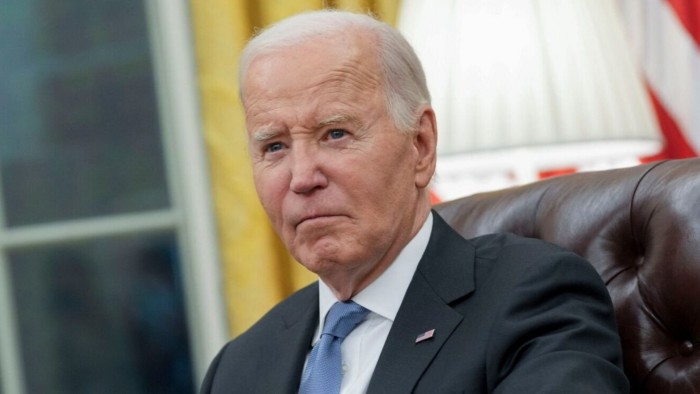Unlock the White House Watch newsletter for free
Your guide to what the 2024 US election means for Washington and the world
President Joe Biden’s administration is seeking to “Trump-proof” its sanctions against Russia by giving Congress the ability to block any attempts to weaken measures against core parts of Moscow’s war machine.
Under measures announced by the US Treasury on Wednesday, around 100 entities from the finance, energy and defence sectors are to be relisted under an unusual sanctions law which requires that Congress be given 30 days to consider any delistings.
The list of affected entities runs from military bodies such as the Tactical Missiles Corporation, which makes weapons, through to the Moscow Exchange, a major financial exchange.
The new authority will give legislators an opportunity to head off any attempts by the new White House to reverse the Biden administration’s efforts to weaken Russia’s military-industrial efforts. If both houses of Congress pass a “measure of disapproval”, delistings can be blocked.
European allies are also poring through the raft of Biden-era sanctions and trade measures to assess the potential impact of Donald Trump rolling them back.
The new legal basis for these listings will also reduce the discretion for the new administration to avoid enforcing existing measures by introducing “mandatory” secondary sanctions for companies that knowingly facilitate significant transactions for or on behalf of any of these entities.
“Today’s actions frustrate the Kremlin’s ability to circumvent our sanctions and get access to the goods they need to build weapons for their war of choice in Ukraine,” said deputy Treasury secretary Wally Adeyemo. “Today’s expansion of mandatory secondary sanctions will reduce Russia’s access to revenue and goods.”
A senior US Treasury official said that they were “trying to send a signal to . . . the whole ecosystem around circumvention” not to risk dealing with anyone on the sanctions lists.
The legislation, “Countering America’s Adversaries Through Sanctions Act” or CAATSA, was passed in 2017 after concerns about Russian electoral interference in the US and Europe.
The Treasury on Wednesday also announced new sanctions on a Kyrgyz bank, Keremet Bank. It said the bank was “strongly linked to a Russian oligarch with ties to the Russian government” and “intended to create a sanctions evasion hub for Russia to pay for imports and receive payment for exports”.
The new listings also cover a person and 15 additional entities that have been setting up “regional clearing platforms” in Russia and China to facilitate cross-border payments for sanctioned goods. The platforms are said to be facilitating “non-cash mutual settlement”.
Source link









